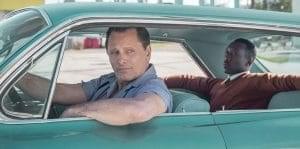
Still, my main complaint is that once you know the setup and how Hollywood movies work, you know almost beat by beat how the film will play out.

“Sometimes the characters have no choice but to suffer...”
I can’t help but note that the director and all three writers are white (Vallelonga, Farrelly, and Brian Hayes Currie). There were many black folks involved in the production, including Octavia Spencer who is an executive producer but does not act in the film. I have no particular complaints that these writers got anything wrong, though I’m not qualified to properly judge the black experience (I did grow up in the South and I can at least vouch for the fact that they got the racism right). My point is just that I long for the day when every Hollywood film about the black experience has at least one black writer.
The usual thing in movies about racism is that characters learn to be less racist by befriending someone from another race. That’s all well and good, but it doesn’t address systemic racism. Refreshingly Green Book does that in that the main antagonist is the system itself. The characters here deal with humiliation after humiliation, and usually, there’s no “Hollywood solution,” like just punching your way out of danger. The danger is ever-present and all around you. Sometimes the characters have no choice but to suffer.
I’m not sure Green Book will make my top 10 list of films for the year — it is an exceptionally strong year. Still, it is an important movie and a fun one too. That’s such a rare combination that you owe it to yourself to see it.

Green Book (2018) Directed by Peter Farrelly. Written by Brian Currie, Peter Farrelly, Nick Vallelonga. Starring Viggo Mortensen, Mahershala Ali, Linda Cardellini.
Rating: 9/10


Well – as a vehicle designed to impact as wide an audience as possible, it’s a film that does make some obvious trade-offs and slants toward being a ‘feel good’ Hollywood production. But likely a tradeoff that was worth making. What I like is its complexity. It brings social class into the picture and messes up the tidy stereotypes we often operate with. And it does so without disappearing or downplaying the nastiness and fact of racism. I read a review that went overboard with the title and the Green Book (which isn’t overly referenced in the film). It read like a contrived artifact that the writer used to try to develop a critical perspective on the film. He’s right that the Green Book is a sordid history all of its own. But given the literacy level of Tony, the driver, I’m not surprised that he barely pays attention to it and despite the title, it plays a minor role in the film. It would be odd and contradictory if it did otherwise. That would undermine this film’s strength – the way class and race – in their many complexities, make for a thought-provoking mix.
A decent movie. Probably more interesting if you are a Millennial or younger and don’t know the history of how life was for black people in the ’60s, ’70s, and earlier. It will be less earth-shattering if you are a Babyboomer and lived these times, or you saw “Ray”, “Hidden Figures”, etc. I was not familiar with this particular semi-biographical story, but I’m now intrigued to learn more.
My husband and I were ardent fans of Don Shirley, we followed his career early on, heard him play and saw him perform several times. Many do not know he was a very respected stage set designer. His rendition and interpretation of Happy Talk from the show South Pacfic is out standing. A great talent who was missed by many.